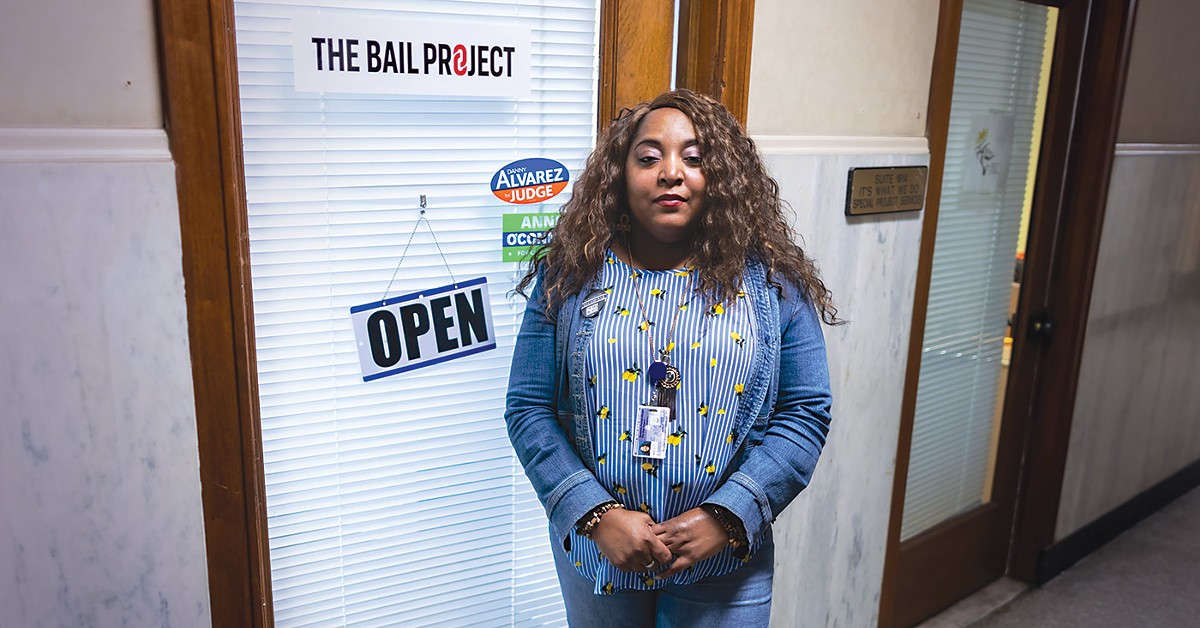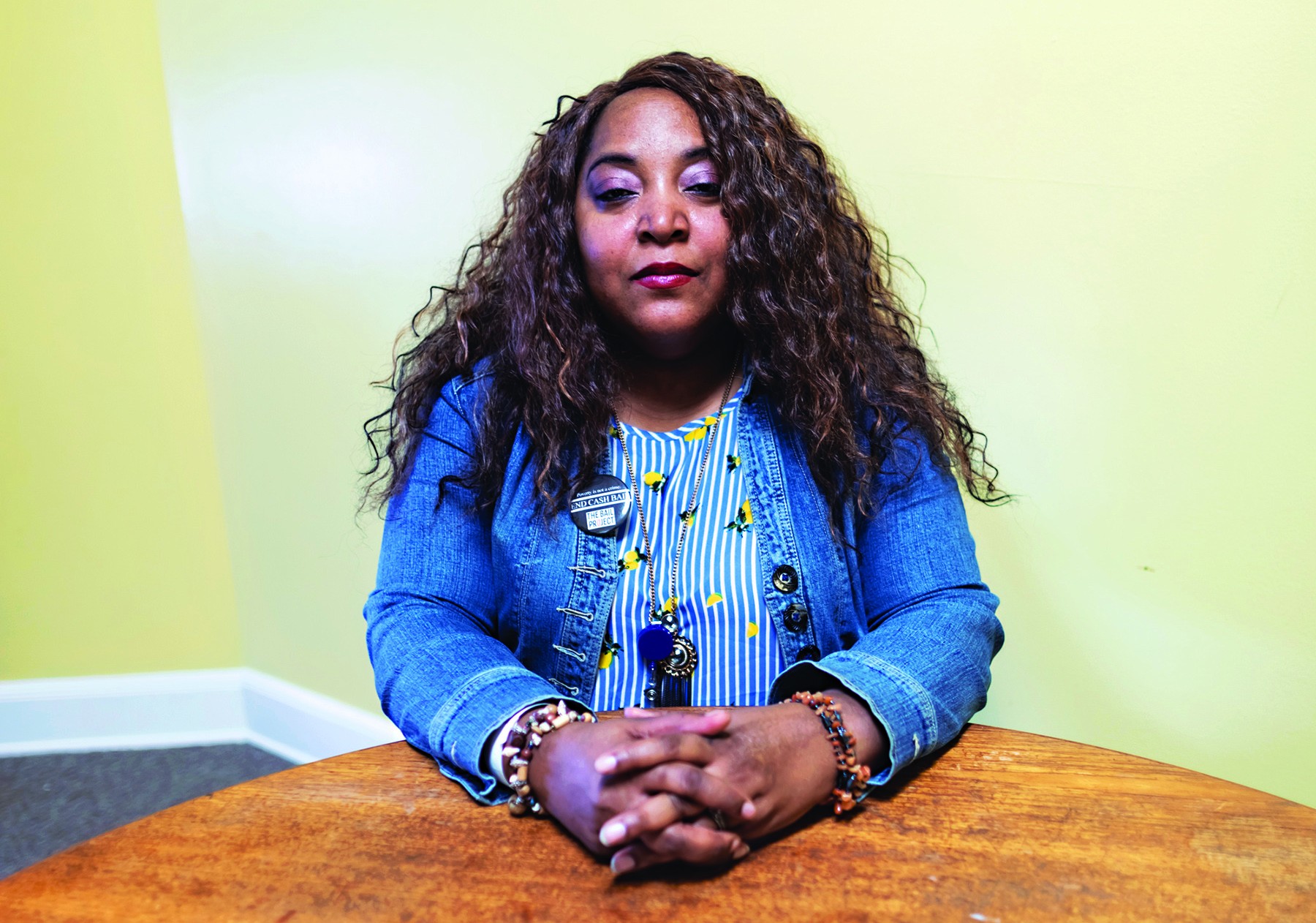During Shameka Parrish-Wright’s jail stay, she made a friend.
Her friend faced a charge of felonious aggravated assault. So did Parrish-Wright, stemming from what she says was self-defense.
The difference was that Parrish-Wright couldn’t pay the $1,000 bail.
The friend could and was released.
The 18-year-old Parrish-Wright spent 38 days in jail, cut off from her 3-year-old daughter and plans to enter college, until she finally decided the only way out was to take a plea deal for a misdemeanor.
She believes that if she hadn’t been trapped in jail before a trial, she might have had the clear head to advocate for a different, better outcome. Regardless, she was not a flight risk or a danger to society, and she was not guilty of a crime until it was proven. But she was in jail.
“If my bail had been paid I could have been a mother, been a college student, fought my case — all at the same time,” said Parrish-Wright. “But because I was in there, stuck on bail, I was willing to take whatever they gave me.”
Some Kentucky lawmakers want to change the state’s cash bail system, so that it’s used only retroactively to ensure a defendant’s appearance in court, not to keep people in jail.
This push to reform the cash bail system has gained support from judges, prosecutors, victim advocates and activists, although they each have differing opinions on the best way to change it.
State Rep. John Blanton, R-Salyersville, already has filed a bill to address the issue. He said the purpose of introducing his legislation was to bring people together to discuss what bail reform should look like.
The process has already started.
In the Senate, judiciary committee chair Whitney Westerfield, R-Hopkinsville, also is eager to address bail reform. “Under our current bail system, with money as a component of bail, if you’re wealthy enough, you can always get out of jail no matter what you did,” said Westerfield. “If you are poor enough, you can’t get out of jail no matter what you did.”
Past efforts for bail reform have failed in Kentucky, including a comprehensive criminal justice bill backed by Gov. Matt Bevin last year. The resistance came from judges and prosecutors who felt it was too lax on freeing defendants. It required them to release, without bond, many defendants who were not charged with violent crimes or sex crimes, and it waived nonfinancial conditions of pretrial release, such as drug screens and GPS tracking. Often, judges don’t want to be blamed for releasing someone who goes on to commit more crimes or who flees.
This year, bail reform supporters have a new ally: Moved by the growing cost of incarceration to the state and impact on the labor force, the Kentucky Chamber of Commerce says bail reform is one of its top legislative issues for 2019.
Victim advocates also are supportive of eliminating cash bail, although they would like more of their interests included in reform, such as involvement in hearings held to decide whether defendants should be detained without bond.
And some judges and prosecutors, once afraid of relaxed restrictions, are talking with Blanton about his bill. One reason: It preserves judges’ power to detain defendants they feel the need to, and it allows nonfinancial conditions of release.
Shane Young, Commonwealth’s Attorney for Hardin County, was staunchly against last year’s bail reform, but is supportive of Blanton’s current bill.
“The long and the short of it is, as long as the person is not a flight risk and not a danger, as long as they can be released on nonfinancial conditions like drug screens and stuff like that, then you know, I don’t really have a problem with it,” he said.
As a result, Blanton thinks his bill stands “a very good chance” of passing.
But now, resistance could come from the other side, advocates of cash bail reform who are against things contained in Blanton’s bill, including judge discretion.
One side says people released before trial need more help showing up for court, while others worry about making sure released defendants stay drug-free and away from others.
Do we need to keep being tough on crime, or are we thinking about it wrong?
How we got here
In some ways, Kentucky is surprisingly revolutionary when it comes to bail.In 1976, Kentucky became one of the first states to outlaw the commercial bail bond industry, which Indiana still has.
The law started a practice of assigning bonds to defendants based on a pretrial assessment of factors, such as the seriousness of their crime and where they live. Defendants are then assigned a level of risk for rearrest and dodging court.
Ideally, judges are supposed to take defendant’s scores into consideration when deciding whether to assign a bond. They’re also supposed to consult a “uniform bail schedule” based on the defendant’s crime to decide the bond amount. But many judges don’t, said Jefferson County District Court Division 4 Judge Julie Kaelin.
“It’s totally at their discretion,” said Kaelin, who was a criminal defense lawyer before being sworn in as judge on Jan. 6.
As a result, in 2016, there were 64,123 instances of defendants with narrowly-defined nonviolent, nonsexual charges in Kentucky who couldn’t afford their bail, according to statistics from the state’s Administrative Office of the Courts.
Those cases made up 30 percent of all imprisonment for nonviolent, nonsexual offenses.
While Blanton and other lawmakers cite the injustice of cash bail as the top reason for bail reform, money is driving the issue, too. Mass incarceration comes with a motivating price tag for the state.
It cost $570 million in 2017 to run Kentucky’s prison system, according to the data from the state’s Department of Corrections. In December, Forty-seven percent of Kentucky’s inmates lived in the state’s jails and only 32 percent of all who were incarcerated were associated with violent and sex crimes. It costs approximately $31 a day on average to keep a defendant in jail.
Freeing low-risk defendants from jail could potentially save millions. It’s a tantalizing incentive that likely has the support of Bevin. A criminal justice task force he created recommended limiting the use of cash bail, and he supported last year’s bill that included a proposal to reform it drastically.
What it would do
Blanton’s proposed legislation wouldn’t get rid of cash bail. Instead, it would give judges the option to assign an unsecured bond for low- and medium-risk defendants, as determined by pretrial assessment. That would mean no cash up front. The defendant would only have to pay if they failed to show up for court.Defendants also could be subject to nonfinancial conditions if released, such as drug tests or GPS tracking.
To keep potentially dangerous people in jail or those who would flee if released, judges could call a detention hearing for low- and medium- risk defendants. Judges would be compelled to call a hearing for high-risk defendants.
At the detention hearings, defendants would have a right to testify and the right to an attorney to argue their case to the judge. The judge would consider the same factors contained in a pretrial risk assessment to determine whether to detain the defendant without bond.
Detention hearings would be required within five days of a defendant arriving in jail.
Blanton believes his bill is conservative. He made it that way for a reason.
“It can’t just be [a] let’s-turn-everybody-out approach to justify cutting the costs of overfilling our prisons,” he said. “It has to be where that we are making sure those that are actually committing crimes are getting their ample sentences and they’re serving their time.”
Blanton said his bill is not complete, and he does not expect it to pass as filed.
Two days into the legislative session, Blanton had already met with a district judge and the chair of the House judiciary committee. More meetings, with the Justice & Public Safety Cabinet, Commonwealth’s Attorneys and the Administrative Office of the Courts have already been scheduled.
Westerfield plans to hold a joint judiciary informational meeting about bail reform, too.
Blanton is inviting everyone to the table to talk about bail reform, he said, including those who want more progressive legislation.
The Bail Project
Shelton McElroy was 18 and homeless when, he said, he was caught trespassing on an acquaintance’s property. He had stolen their marijuana and was eating their food and drinking their alcohol when he was caught.McElroy’s bond was $500.
Neither he nor his foster mother could afford it.
“That $500 was like asking her for $50,000,” McElroy said.
After four months in jail and facing a five-year sentence, McElroy took a plea deal for four years in prison.
Like Parrish-Wright, if he had not been detained in jail, McElroy believes he could have continued on with life, schooling and work and had the autonomy to fight his case.
Today, after finding a mentor, connecting with community resources and earning a masters degree, McElroy is the national deputy director of operations for The Bail Project. The people he helps now are in the same dead-end situation he was in.
The Bail Project is a national group that collects money to bail defendants out of jail. In May, it opened an office in Louisville, where Parrish-Wright is manager.
She has seen a defendant with bail as low as $25, the filing fee, that they couldn’t afford to pay. The average amount that bail is set at in Jefferson County is $12,778, according to the Administrative Office of the Courts. The Bail Project pays bail in amounts up to $5,000.
While defendants are languishing in prison without being able to afford bail, their jobs, families and bill collectors need them as much as ever.
The impacts of bail are worse for people of color. Princeton University analyzed data from courts in Miami and Philadelphia and found people of color were more likely to be held on cash bail and more likely to have their bail set at a higher amount than white people.
As in the case of Parrish-Wright, defendants may take plea deals to get out. Sometimes, when a defendant has been held for too long and doesn’t have a job or has been kicked out of their apartment, they reoffend.
This is backed up with data.
The longer a low- or moderate-risk defendant is in jail in Kentucky, the more likely they are to reoffend when they’re out before their trial or in the two years after their cases end, according to data published in 2013 by the Laura and John Arnold Foundation, a Houston-based organization that studies criminal justice and other issues.
Bail hasn’t been shown to be the only way to get defendants to show up in court, either.
Parrish-Wright said The Bail Project has helped 500 people in Louisville pay their bail, 89 to 90 percent of whom have made it to their court dates. In addition to providing the money, the group sends reminders to defendants about court appearances and rallies to take care of their transportation and other factors that keep them from showing up.
McElroy commended the legislature for considering bail reform, but he described an ideal policy that was more extensive than Blanton’s.
Instead of just bail reform, The Bail Project advocates for:
• connecting released defendants to social services and resources
• call reminders to ensure people make it to court
• and “release on recognizance,” meaning defendants are released simply with a written promise that they will show up for court and not engage in illegal activity while out.
With those provisions, cash bail isn’t necessary at all, McElroy said.
He does not want bail reform to include the pretrial risk assessment. The Bail Project believes the factors considered during the assessment can discriminate against minorities and those in poverty, such as whether the defendant has a residence or a job.
Blanton’s proposed legislation is similar in some ways to California’s bill that nixed cash bail altogether last year. The ACLU and The Bail Project both opposed the legislation on the grounds that it gave judges just as much discretion to detain. Robin Steinberg, the CEO of The Bail Project, said in a TED Talk that California’s law could potentially increase pretrial incarceration, although there’s no way to tell, as the bill is still in limbo because of legal opposition from the bail industry.
The jailkeeper
Metro Department of Corrections Director Mark Bolton thinks bail reform could relieve his crowded jails, which have been so full that the last time they were just “at capacity,” not above it, was January 2017.On Jan. 9, 2019, Bolton’s jails held 1,800 people, over the 1,793-bed capacity.
Bail reform isn’t about being soft on crime, said Bolton.
“It really is about being smart with respect to return on the investment,” he said, explaining that the goal should be “using very expensive, finite jail space for those people who we are afraid of, and providing other services for those people that we might be pissed off at.”
Bolton doesn’t agree with imposing nonfinancial conditions on released defendants. That would replace “one bad system with another,” which would help no one, he said.
“A person that is living paycheck to paycheck or doesn’t have a stable place to live, the last thing that they’re going to be thinking about is showing up for a counseling appointment when they don’t have transportation, and then all of a sudden they find themselves in violation of the release order, and they’re right back where they started,” he said.
The prosecutor
Young, Hardin County’s Commonwealth’s Attorney, supports bail reform, but he warns against releasing defendants without stipulations.“The rest of the state does not want to become Louisville,” said Young, who worked as a prosecutor in the city for 10 years.
He believes Jefferson County releases too many people, contributing to the crime rate.
Factoring in population, Jefferson County has a high crime rate for several types of offenses, mostly property crimes and assault, according to Kentucky State Police data, but there are conflicting views on what causes it.
Young, in particular, advocates for nonfinancial conditions for released defendants.
Drug screens, in particular, are “huge,” he said. Young uses them to find out who has an addiction and how severe it is, so that they can be given resources.
Young cautions against lawmakers putting cost savings before public safety.
“When you boil down a government’s function, its primary function is public safety. That’s probably No. 1,” he said. “I think everybody needs to be careful on analyzing the criminal justice system just based on dollar signs.”
The victim advocates
Cash bail isn’t seen as protection for victims. In fact, it can be dangerous for them, according to Laela Kashan, the staff attorney for the Kentucky Association of Sexual Assault Programs.When rich defendants who are charged with serious crimes are able to evade jail, that puts victims at risk.
“Victims are not included in any release decision,” Kashan said in an email. “We believe that victims should be consulted.”
For that reason, KASAP is for the elimination of cash bail. But they also don’t support Blanton’s bill. Yet.
The organization believes the legislation could be strengthened to support victims in several ways. It could:
• clarify “avoiding all contact” with victims to include things such as third party contact
• add victim notice and the opportunity to be heard at any detention hearing
• clarify definition of “danger to the public/safety of the public” to specifically include danger to the alleged victim at a minimum
• guarantee access (via LINK) of any conditions of release to law enforcement so that they can be enforced
The judge
Kaelin, the Jefferson County judge, sees the problems with Blanton’s proposed legislation that The Bail Project and other critics do.She knows that pretrial risk assessments can discriminate against certain people, and she realizes that judges, such as her, will still have the discretion to hold people in jail.
But she thinks the detention hearings will be a chance for gaps in the risk assessments to be addressed, and she believes that the bill ultimately encourages judges to avoid detention for defendants who don’t need it.
Her question is how more hearings will affect court caseloads.
But Kaelin also thinks Blanton’s bill is progress and good progress at that.
“I think I actually am surprised at how progressive it is,” she said.
Blanton doesn’t believe that any law — or any criminal justice system — will be perfect.
“That is a utopia,” he said. “And we have to work to find the best system that we can for our citizens of the Commonwealth.” •
To donate to The Bail Project’s revolving, national cash bail fund, visit bailproject.org.







